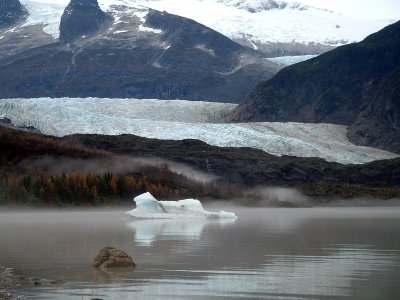 My co-worker likes to tell stories about his childhood in Juneau - in the late 70s, I believe - when he and his friends could play touch football directly in the shadow of Mendenhall Glacier's tilting skyscrapers of ice. Back then, the calving terminus stretched almost a mile beyond where it ends today. My co-worker predicts that in another decade, the glacier will climb away from Mendenhall Lake and recede up the canyon it carved during many millennia of slow, steady grinding.
My co-worker likes to tell stories about his childhood in Juneau - in the late 70s, I believe - when he and his friends could play touch football directly in the shadow of Mendenhall Glacier's tilting skyscrapers of ice. Back then, the calving terminus stretched almost a mile beyond where it ends today. My co-worker predicts that in another decade, the glacier will climb away from Mendenhall Lake and recede up the canyon it carved during many millennia of slow, steady grinding.It's sad, he tells me, to see something that held so much permanence for him as a child, and to watch it so quickly and effortlessly fade away. But when I look at Mendenhall Glacier, I don't feel his same sadness. My emotions are closer to the sadness one would feel watching a snowman grow emanciated in the March sun - a nostalgic sadness, dulled by the inevitability of it.
A poll published October 4 in the Anchorage Daily News said that four out of five Alaskans believe global warming is behind the physical transformation of their homeland - not only the melting glaciers, but also big coastal storms, summer lightening strikes, shifting salmon runs, disappearing polar bears and forest fires. Eighty percent is a robust number for agreement in what many of the higher ups in the United States call "a theory, at best." I think it points to a trend as obvious as glaciers shrinking a quarter mile a decade. It's the trend of acceptance, the third step in the 12-step program to recovery.
I was an environmentalist kid with progressive science teachers, so even in the early 90s, I watched satellites map the hole in the ozone over Australia and accepted global warming as fact. I believe that this current generation of children will be the last to have the option of understanding climate change as a theory or a vague idea. Future students will know the temperature change of this era only as cold fact, like entropy, or gravity. Whether the world will ever agree on whether global warming is human-caused or a force of nature, history has yet to decide. Although it seems most likely that history will determine the root cause of climate change to be a complicated combination of both.
The fourth step of recovery is to make "a searching and fearless moral inventory of ourselves." This is the part where we begin to experiment with the things we know we can control, such as alternative sources of power (especially human power), energy conservation and reduced consumption. We'll never know how much it can help unless we're all willing to try. Otherwise, we're no better off than the alcoholic who says, "Well, God made me this way, and all this booze I buy really helps the economy, so why should I stop drinking?"
Why? Because your future depends on it. No one denies that truth to someone in AA. It won't be long before the world sees global warming in the same way.

Bravo!
ReplyDeleteThank you for such eloquent description of such a sad fact.
God did make me this way, and I do help the economy...
ReplyDelete:/
I had the pleasure of visiting one of the few advancing glaciers in the world in New Zealand earlier this year. I was totally blown away by the size of the ice formations, as was a Swiss tourist in or party, who claimed that none of the Glaciers in Switzerland could match it (probably because they're all melting too).
ReplyDeleteSadly, I'm very skeptical about whether people will ever accept responsibility for doing anything about it. If someone excretes in the street, it's easy to point a finger at them on the basis that it's not something the majority of people do, and thus it's "socially unacceptable". When you're talking about changing the polluting behaviour of the majority, however, it's a different story. Somehow putting nasty things into the air is seen as socially acceptable, even though it's really no different.